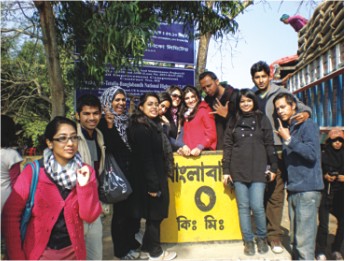Experience
Coming Closer to Rural Realities
Nazia Nazmul
Looking out the window of the speeding bus, I reflected upon my thoughts of how the whole trip would be. My group mates had long fallen to sleep. We were on our way to Thakurgaon, the North Pole of the Bangladesh map, to complete LFE (Live-in-Field Experience), a mandatory three-credit course offered by the Independent University, Bangladesh (IUB). Everyone was filled with a sense of new verve. I, on the other hand, sat a little fretful as I kept thinking back to the fights with my parents who were skeptical of the whole idea of a field experience. LFE is a course where students are divided into groups of five members, and are sent to places like Bogra, Natore, Makinganj, and Thakurgaon for various kinds of field work. Students spend thirteen days under the supervision of faculty members and extremely helpful monitors. On the bus, as my friends sat busy chatting away, I spent some confused moments wondering if indeed, I would enjoy the whole experience. All those worries, however, were to leave me soon as I stepped out of the bus.
 |
The groups of LFE.
Photo courtesy: Nazia Nazmul |
After 9 hours of journey from Dhaka, we reached Thakurgaon and were received by members of the MKP (Manob Kalyan Parishad), a government training centre and NGO. Benazir, Raisa, Asif and Zubaer were my group mates. We have always been on good terms but were never great friends. It wasn't just me, but I guess all the group members were considering how well each member would gel with the other.
On the first day we all went out for breakfast, upon which, each group was sent to different localities to get started. The name of our para (area) was Dhakaiya Para and the only form of transport was a cycle van. Our city life and the life in Thakurgaon are poles apart for all the obvious reasons. For the first time, we had the chance to come closer to rural realities.
Village map, transect map and the para map were the three things that the groups worked on for their first task of the course. The village and the para maps were to be drawn by the villagers on the ground. Our task was to interact with them and help them through it. Transect map was the brief view of the area with certain list of things in it of about 200 steps. Everyone had to work on their presentations that were held every day. The presentation continued till 8:30 and by 9, dinner was served. We were allowed to study till 11 pm, but guess what? We made sure that we were done with our work by 10 pm and the rest of the time would be reserved for chit-chatting till our monitors would forcefully send us back to our assigned rooms.
The social structure and changing process, income and assessment, education and training, economy and rural production cycle, gender division of labour, and rural market structure were some of the study areas in our course. Each group was also given 25 sets of questionnaire surveys and two case studies of two families. Every day would be concluded with stimulating presentations, hearty meals and great conversations. We managed to forget to miss our families or the city life that we had left for a few days.
Amidst the good times, our minds unconsciously found new things to learn and little did we realise how close we had gotten to each other. It is a course where everyone aims to achieve the best grade but they always come back home with so much more. We learnt about social changes that have taken place along the years and how income levels have improved. We were required to go into the local haat (local market place), where trading of domestic animals takes place. The place was so overwhelmingly dirty and yet, we enjoyed sitting down on the floors and scour out facts.
We also made an excursion to the zero point, in other words, the borderline of Bangladesh and India. My group had become close to the villagers and we were overwhelmed by their hospitality towards us. The days went by so fast till the annual dinner night when, deep inside, I began to feel that it was the most surreal few days I had spent with people that I call fiends. We were no longer just a couple of groups, but one big family.
The night ended with a bonfire. I don't know when Benazir became Beni, or Raisa, Rice pice; Asif became Daddy Asif and Zubaer, Zoobi Doobi. All these nicknames of course had their stories that only remind me of how these five individuals started depending on each other. Thakurgaon was a place with 4 degrees celsius, very unusual for us, but with the accommodation provided by MKP and IUB, time did fly by and we did not notice the sudden temperature shift. We returned home with a lifetime of experiences, great stories and some unbreakable friendships to keep us thankful for the rest of our lives.
(The writer is a student of Media and Communications at IUB.)
|
